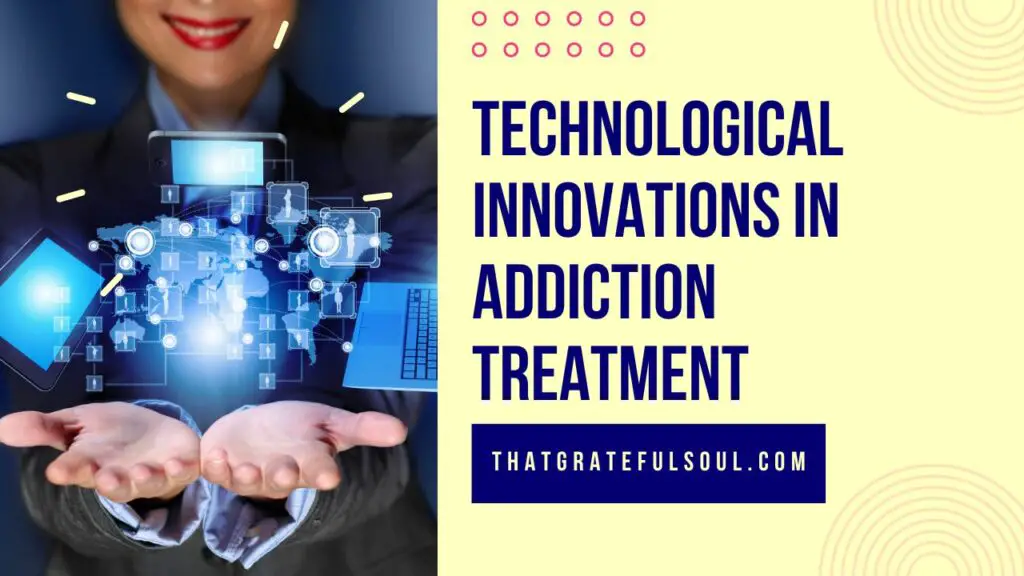In recent years, technological advancements have revolutionized various industries, and addiction treatment is no exception.
With addiction rates soaring and the need for effective interventions becoming more pressing, innovative technologies have emerged as valuable tools in the battle against substance abuse.
From virtual reality therapy to smartphone apps and wearable devices, this article explores the latest technological innovations in addiction treatment and their potential to transform the recovery journey.

-
Save
Table of Contents
Technological Innovations in Addiction Treatment
1. Virtual Reality Therapy: Escaping the Cravings
Virtual reality (VR) therapy has gained significant attention for its ability to immerse individuals in realistic, computer-generated environments.
This technology has shown promise in addiction treatment by providing an immersive and controlled environment for exposure therapy.
Through VR, individuals can confront triggers and high-risk situations without the need for real-world exposure, reducing the risk of relapse and offering a safe space for practicing coping strategies.
2. Smartphone Apps: Support at Your Fingertips
Smartphone apps have become ubiquitous in our lives, and they are now being leveraged to support addiction treatment and recovery.
These apps offer a range of features, including relapse prevention tools, mood tracking, motivational messages, and access to support networks.
Additionally, some apps provide educational resources, self-assessment tools, and daily inspirations to keep individuals engaged and motivated throughout their recovery journey.
3. Wearable Devices: Monitoring and Accountability
Wearable devices, such as fitness trackers and smartwatches, are not limited to counting steps and tracking heart rates. They are now being integrated into addiction treatment as powerful monitoring tools.
These devices can track vital signs, and sleep patterns, and even detect signs of substance use.
By providing real-time data, wearable devices enable healthcare professionals to monitor patients remotely, identify potential triggers, and intervene promptly if necessary, fostering a sense of accountability and improving treatment outcomes.
4. Telemedicine: Breaking Barriers to Access
One of the most significant barriers to addiction treatment is access to care, particularly for individuals in remote areas or those with limited mobility.
Telemedicine, or remote healthcare, has emerged as a solution to bridge this gap. Through videoconferencing, individuals can now access counseling, therapy sessions, and medical consultations from the comfort of their own homes.
Telemedicine not only improves access to treatment but also reduces the stigma associated with seeking help, allowing individuals to receive the support they need in a more convenient and confidential manner.
5. Artificial Intelligence: Personalized Interventions
Artificial intelligence (AI) is making waves in addiction treatment by offering personalized interventions and predictive analytics.
AI algorithms can analyze large volumes of data, such as treatment outcomes, patient demographics, and risk factors, to identify patterns and predict the likelihood of relapse.
By leveraging this technology, healthcare professionals can tailor treatment plans to individual needs, identify high-risk patients, and intervene proactively to prevent relapse, ultimately enhancing the effectiveness of addiction treatment.
Conclusion
Technological innovations are reshaping the landscape of addiction treatment, bringing hope to individuals struggling with substance abuse and revolutionizing the way recovery is approached.
From virtual reality therapy and smartphone apps to wearable devices and telemedicine, these advancements offer new avenues for support, monitoring, and personalized interventions.
As technology continues to evolve, it is crucial for addiction treatment providers to embrace these innovations, harness their potential, and integrate them into comprehensive and evidence-based treatment approaches.
By doing so, we can pave the way for a future where technology becomes an integral part of the recovery journey, empowering individuals to reclaim their lives from addiction.
-
Save

